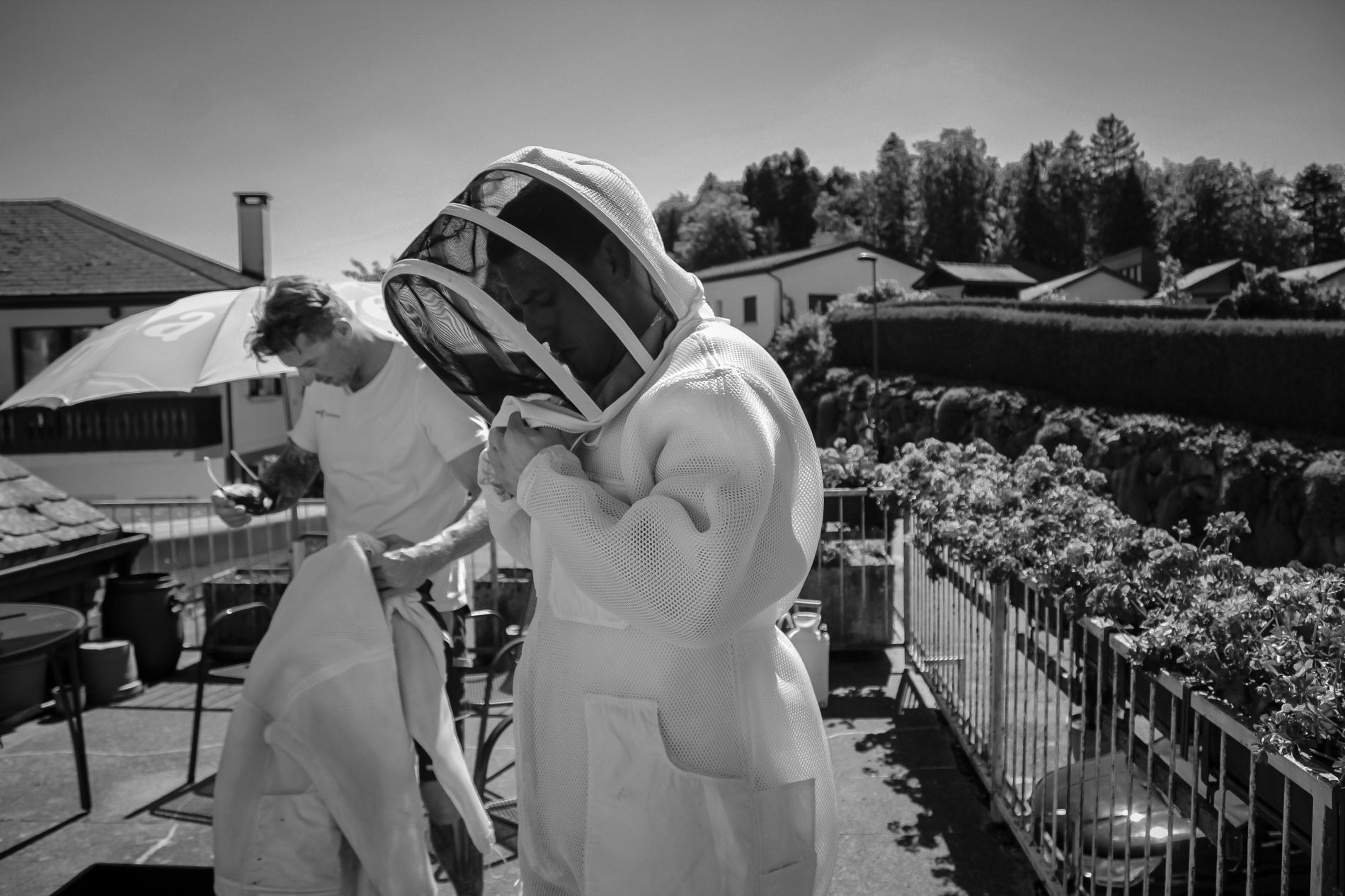
Fighting Asian hornets in Liesberg
Have you discovered an Asian hornet's nest? We'll be on site quickly! Call now - Daily Mon-Sun 07:00-21:30. Contact us now: 058 510 22 54
Having the Asian hornet's nest removed
The invasive expansion of Vespa velutina, a hornet species from South-East Asia, has encompassed Switzerland and the entire subcontinent. While not posing a direct threat to humans, these hornets have gained infamy as honey bee predators, triggering alarm among beekeepers. Within just a few hours, a few of these hornets can launch an attack and successfully wipe out an entire bee colony. If you have discovered a hornet's nest on your house, patio, shed, or in your blind box, contact our experts for hornet nest removal in Liesberg!
Use the uncomplicated telephone service of the Hornet experts in Liesberg and simply inform us at 058 510 22 54, we will be on site quickly so that you and everyone in your area feel completely safe again.
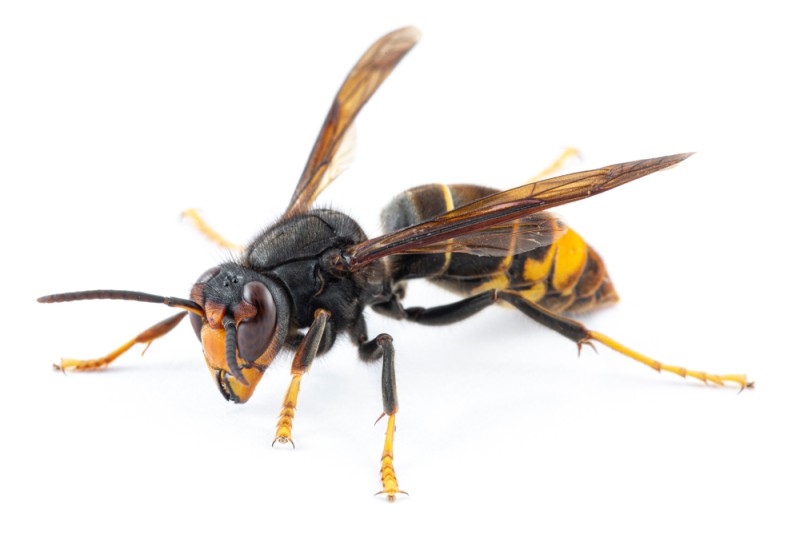

Appearance of the Asian hornet
Here are some characteristics that distinguish the Asian hornet:
1. Size: The queen can reach a length of about 3 cm, while the workers are slightly smaller and measure about 2.5 cm.
2. Color: The Asian hornet has a dark body that is almost black, with a yellow stripe at the back of the abdomen. Its face is orange-yellow.
3. Wings: The wings are dark and almost smoky gray.
4. Legs: The hornet has yellow tips on its legs, which is a striking distinguishing feature when it flies.
5. Nest: The Asian hornet's nest is often high in the trees, but it can also be found underground or in tall structures such as chimneys. It has an oval shape and is made of chewed wood, which gives the hornet a papery texture.
It is important to distinguish the Asian hornet from the European hornet (Vespa crabro), which is more harmless and a natural part of the European fauna. If you suspect you have found an Asian hornet nest near you in Liesberg, you should report this to the local authorities, or using our reporting form, as they can spread quickly and be harmful to bees and other insects. To avoid being attacked by the flying inhabitants, you should hire a professional pest controller such as the Hornet Experts Liesberg. We can identify the nest beyond doubt and take further steps to remove the Asian hornets professionally.
News about the Asian hornet in Liesberg
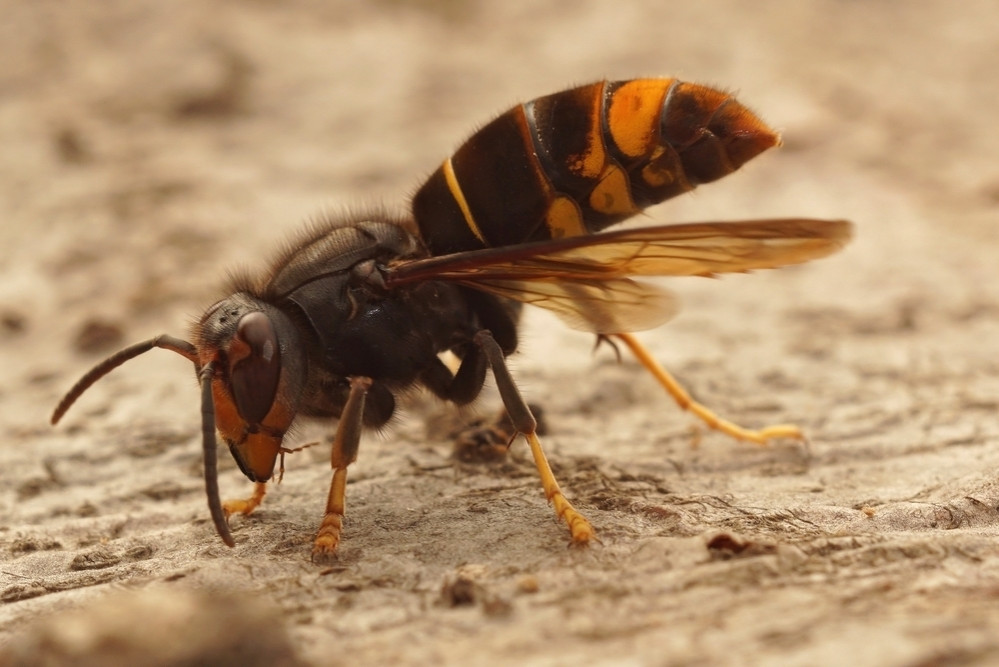
02.12.2025 Western Switzerland: Killer hornet eats bees
The territory of the Asian killer hornet has expanded considerably this year, with a notable increase reported in western Switzerland. This invasive species poses a significant threat to native bee populations, as bees make up the majority of its diet. The potential consequences are serious. Moreover, the hornet represents a danger to individuals with allergies to its venom.
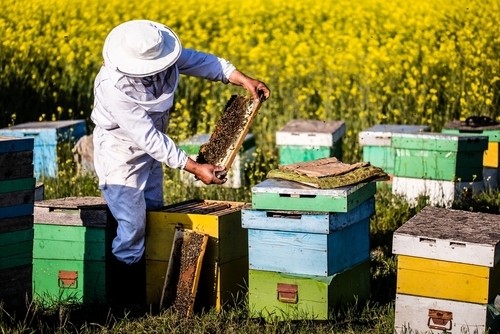
25.11.2025 Serious concerns about the bee population!
Asian hornets are inflicting significant harm on beehives across multiple parts of Europe, as reported by local beekeepers. Even a small number of hornets can destroy an entire bee colony within hours. This sharp decline in pollinators could have serious consequences for pollination, local ecosystems, and agricultural productivity.
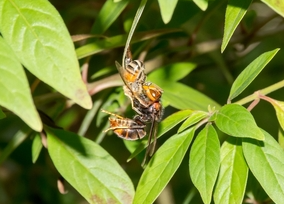
18.11.2025 Asian hornet doesn't just eat bees!
The danger it presents to insects is substantial!
The Asian hornet feeds largely on honeybees—up to 85 percent of its diet—alongside beetles and flies. This high level of predation not only poses difficulties for fruit growers but also further threatens already vulnerable bee populations.
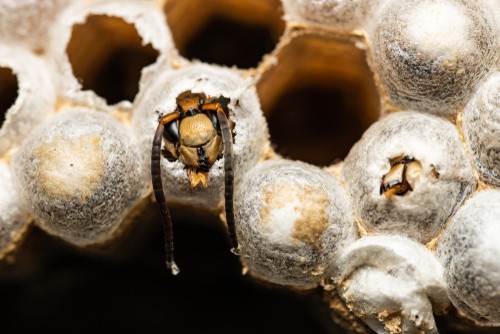
11.11.2025 How did the Asian hornet get to Europe?
The Asian hornet likely arrived in Europe unintentionally and has quickly expanded throughout France and nearby countries. Its adaptability to different environments and the absence of natural predators have contributed to its rapid spread. A single nest can generate several hundred new queens in one breeding season.
Asian Hornet Reporting Form
Please fill out all required fields and submit the form.
Help us!
If you discover an Asian hornet or a nest of this invasive species in Liesberg, it is of the utmost importance that you report it immediately. The Asian hornet is not only dangerous to humans, but also poses a serious threat to native bee populations and the ecological balance in Switzerland.
Why is it important to report the find?
The Asian hornet's presence in established regions has a significant impact on native insects, especially honey bees. Through their predation on bees, these hornets contribute to a decrease in pollinator populations, leading to effects on the local flora and agricultural production. By reporting sightings, experts can react quickly, remove the hornets or their nests and thus prevent the spread of this invasive species.
Notification form for sightings
By taking action to regulate the Asian hornet overpopulation in Switzerland, we can protect our native insect populations. We urge you to report any suspicions or sightings using our specialized reporting form. With your cooperation, we can intervene early and minimize the spread of this dangerous species in our ecosystems.
Your contribution is crucial in the fight against the Asian hornet in Liesberg. Together we can protect nature and maintain the balance of our ecosystems;
Thank you for your vigilant attention and your commitment to protecting our environment.
How dangerous is the Asian hornet?
The Asian hornet (Vespa velutina) is a predatory insect that originated in Asia and has spread in recent years to various parts of Europe, including France and now also Switzerland and in Liesberg. Although it poses a threat to honey bees and native biodiversity, it is generally no more dangerous to humans than other wasp species. Nevertheless, there are some aspects to be aware of:
1. Threat to honey bees: The Asian hornet preys on honey bees, threatening native bee populations. A decline in bees can have a negative impact on pollination and thus on local flora and agricultural production.
2. Stings: As with other wasp and hornet species, the stings of the Asian hornet can also be painful. For most people, the stings are unpleasant but not dangerous. However, people who are allergic to wasp or hornet stings can suffer a severe allergic reaction, which in the worst case can lead to anaphylactic shock.
3. Aggressiveness: Although the Asian hornet is not necessarily more aggressive towards humans than other wasp species, it can become aggressive if it feels threatened, especially near its nest.
4. Ecological effects: Apart from the direct effects on honey bees, the spread of the Asian hornet can also disturb the ecological balance by affecting the populations of other insects.
It is important to note the difference between the Asian hornet and the Asian giant hornet (*Vespa mandarinia*), known as the "killer hornet". The giant hornet is noticeably larger and may pose a higher risk to humans due to its more potent venom and the size of its sting.
If you have discovered a nest, call us immediately: 058 510 22 54
Our hornet professionals in Liesberg are certified by the VSS.
Frequently Asked Questions About Asian Hornets in Liesberg
With its ability to deliver stings that can cause potentially serious or even fatal consequences, the Asian hornet stands out as an insect of significantly greater danger than most other hornet species.
Possessing notable proportions, the Asian hornet can grow to a length of 3 cm. Its sleek, black exoskeleton is adorned with a dense array of captivating orange, yellow, and black stripes.
Human health can be seriously affected by the Asian hornet's toxic bite, which causes pain and can induce allergic responses.
Humans must be aware of the Asian hornet's highly poisonous venom. Being bitten by this insect can cause excruciating pain and may spark allergic reactions.
The Asian hornet's venomous sting sets it apart as a dangerous species. More painful than that of other wasps, its sting can provoke allergic reactions, increasing the level of risk it poses.
When faced with an Asian hornet, it is imperative to report it by contacting either a regional officer for wild bee conservation or the relevant agency within the Ministry of Agriculture.
It is crucial to report the presence of Asian hornets to prevent attacks and curtail the spread of these highly territorial and aggressive insects.
To combat the infestation of Asian hornets in Switzerland, professional hornet control is necessary. It is recommended to contact a pest control service provider for reliable assistance.
The Asian hornet is not covered by protection regulations; nevertheless, thorough monitoring efforts are vital to prevent their further expansion.
During hibernation, Asian hornets may choose to hibernate in groups, collectively gathering in the corners of walls, buildings, garden sheds, chance houses, or tree hollows, or they may prefer solitary hibernation.
Would you like more information about Asian hornets? Then take a look at our FAQ's about Asian hornets.
Private inquiry form
For an uncomplicated request to remove an Asian hornet's nest, please use our contact form for private individuals.
Real estate inquiry form
Use our property management order form to request the removal of an Asian hornet's nest.




_12.jpeg)
_12.jpeg)
_13.jpeg)
_13.jpeg)